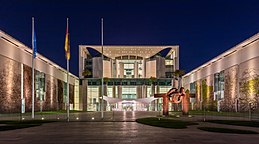German Federal Chancellery
| Bundeskanzleramt | |
 |
|
 |
|
| Agency overview | |
|---|---|
| Formed | 1867, 1878, 1949 |
| Jurisdiction | Government of Germany |
| Headquarters |
Federal Chancellery building, Berlin (primary) Bonn (secondary) |
| Annual budget | €71.344 million (2017) |
| Agency executive | |
| Website | bundesregierung.de |
The German Chancellery, (German: Bundeskanzleramt, more faithfully translated as Federal Chancellery) is an agency serving the executive office of the Chancellor of Germany, the head of the federal government, currently Angela Merkel. The Chancellery's primary function is to assist the Chancellor in coordinating the activities of the federal government. The Head of the Chancellery (Chef des Bundeskanzleramtes) holds the rank of either a Secretary of State (Staatssekretär) or a Federal Minister (Bundesminister), currently held by Helge Braun. The headquarters of the German Chancellery is at the Federal Chancellery building in Berlin.
When the North German Confederation was created as a federally organised country, in 1867, the constitution mentioned only the Bundeskanzler as the responsible executive organ. There was no collegial government with ministers. Federal Chancellor Otto von Bismarck in the beginning only established a Bundeskanzleramt as his office. It was the only 'ministry' of the country until in early 1870 the Prussian foreign office became the North German foreign office. At that occasion, the Bundeskanzleramt lost some tasks to the foreign office.
When the North German Confederation became the German Empire in 1871, the Bundeskanzleramt was renamed to Reichskanzleramt. It originally had its seat in the Radziwiłł Palace (also known as Reichskanzlerpalais), originally built by Prince Antoni Radziwiłł on Wilhelmstraße 77 in Berlin. More and more imperial offices were separated from the Reichskanzleramt, e.g. the Reichsjustizamt (Office for National Justice) in 1877. What remained of the Reichskanzleramt became in 1879 the Reichsamt des Innern (the home office).
...
Wikipedia
